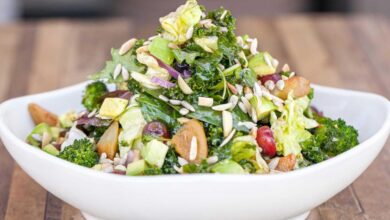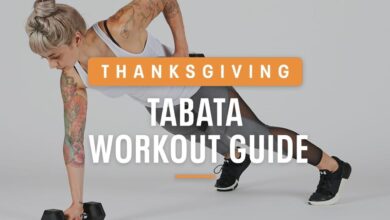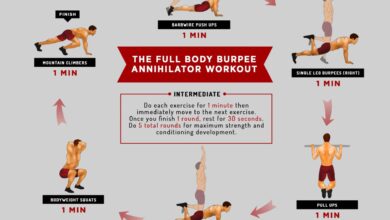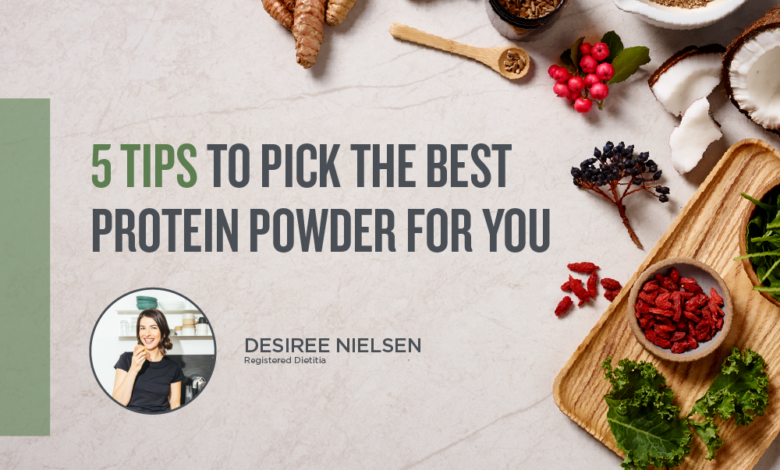
5 Tips on Picking the Best Protein Powder for You
5 Tips on Picking the Best Protein Powder for You: Protein powder has become a staple in many fitness enthusiasts’ routines, offering a convenient way to boost protein intake and support muscle recovery. But with so many options on the market, choosing the right protein powder can feel overwhelming.
This guide will walk you through five key factors to consider when selecting the best protein powder for your individual needs, ensuring you make an informed decision that aligns with your fitness goals and dietary preferences.
From understanding your specific requirements to considering taste, texture, and budget, we’ll delve into the nuances of protein powder selection. By the end, you’ll be equipped with the knowledge to choose a protein powder that fits seamlessly into your lifestyle and helps you achieve your desired results.
Understanding Your Needs
The right protein powder can be a valuable tool for reaching your fitness goals, but choosing the best one requires understanding your individual needs. Before you head to the supplement aisle, it’s crucial to define your fitness goals and consider your dietary requirements.
Identifying Your Fitness Goals
Knowing what you want to achieve with protein powder will help you narrow down your options. Do you want to build muscle, lose weight, or improve your overall health? Are you training for a specific sport or event? Answering these questions will help you choose a protein powder that supports your specific objectives.
Dietary Requirements and Restrictions
Your dietary needs and restrictions play a significant role in selecting the right protein powder. Consider the following:
- Are you vegan or vegetarian?
- Do you have any allergies or intolerances, such as lactose intolerance or soy allergies?
- Are you following a specific diet, such as keto or paleo?
Choosing a protein powder that aligns with your dietary needs ensures you’re getting the nutrients you need without compromising your health.
Assessing Your Activity Level
Your activity level influences your protein needs.
- If you’re sedentary, you might not need as much protein as someone who is very active.
- Athletes and those who engage in intense exercise typically require more protein to support muscle growth and repair.
Desired Outcomes
Think about what you hope to achieve with protein powder.
- Are you looking for a quick and convenient way to increase your protein intake?
- Do you want a protein powder that supports weight loss or muscle building?
- Are you seeking a protein powder with added nutrients, such as vitamins and minerals?
Self-Assessment Checklist
To help you identify your needs, consider these questions:
- What are your fitness goals? (e.g., muscle gain, weight loss, improved recovery)
- What is your activity level? (e.g., sedentary, moderately active, highly active)
- Do you have any dietary restrictions or allergies? (e.g., vegan, lactose intolerant, soy allergy)
- What are your desired outcomes from using protein powder?
Protein Source and Type: 5 Tips On Picking The Best Protein Powder For You
Choosing the right protein source is crucial for maximizing the benefits of protein powder. Each protein source has unique characteristics that influence its digestibility, absorption, and potential allergens.
Whey Protein
Whey protein is derived from milk and is a popular choice due to its rapid absorption and high biological value. It is a complete protein, containing all nine essential amino acids. Whey protein is particularly beneficial for muscle growth and recovery after exercise.
- Pros:Rapidly absorbed, high in BCAAs, supports muscle growth and recovery, often less expensive than other protein sources.
- Cons:May cause digestive issues in some individuals, not suitable for those with lactose intolerance.
- Examples:Whey protein concentrate, whey protein isolate, whey protein hydrolysate.
Casein Protein
Casein protein is also derived from milk but digests more slowly than whey protein. It provides a sustained release of amino acids, making it ideal for overnight muscle protein synthesis.
Finding the right protein powder can be a game-changer for your fitness journey. From choosing the right type of protein to considering your dietary needs, there’s a lot to think about. But remember, protein is just one piece of the puzzle.
For lasting weight loss, it’s essential to focus on making sustainable lifestyle changes, like those outlined in 10 Simple Changes That Lead to Weight Loss. Once you’ve got your protein powder sorted, you can confidently incorporate it into a balanced diet and exercise routine for optimal results.
- Pros:Slow-digesting, promotes satiety, supports muscle growth and recovery, may aid in weight management.
- Cons:Can cause digestive discomfort in some individuals, not suitable for those with lactose intolerance.
- Examples:Micellar casein, calcium caseinate.
Soy Protein
Soy protein is a plant-based protein source that is a complete protein. It is a good choice for individuals with lactose intolerance or who are looking for a vegan protein option.
- Pros:Complete protein, low in fat, may lower cholesterol levels, suitable for vegans.
- Cons:Some individuals may have soy allergies, may contain isoflavones that can have hormonal effects.
- Examples:Soy protein isolate, soy protein concentrate.
Plant-Based Protein Options
Plant-based protein powders offer a variety of options for individuals following a vegan or vegetarian diet.
- Pea Protein:A complete protein that is hypoallergenic and easily digestible. It is a good source of iron and fiber.
- Brown Rice Protein:A hypoallergenic and gluten-free option that is rich in fiber and essential amino acids.
- Hemp Protein:A complete protein that is a good source of omega-3 fatty acids and fiber.
- Pumpkin Seed Protein:A complete protein that is a good source of iron, magnesium, and zinc.
- Sunflower Seed Protein:A complete protein that is a good source of vitamin E and fiber.
Key Ingredients and Additives
Beyond the protein source itself, the ingredient list of a protein powder can significantly impact its nutritional value and overall health benefits. It’s essential to be mindful of added sugars, artificial sweeteners, and fillers, while also recognizing the potential benefits of certain ingredients like creatine or digestive enzymes.
Essential Amino Acids and Other Nutrients
The presence of essential amino acids is crucial for protein powders, as these are the building blocks of protein that our bodies cannot produce on their own. Protein powders should ideally provide a complete amino acid profile, including branched-chain amino acids (BCAAs), which are particularly important for muscle growth and repair.
Additionally, some protein powders may be fortified with other beneficial nutrients like vitamins, minerals, or probiotics.
Choosing the right protein powder can be a challenge, but it’s definitely worth the effort! From whey to soy, there are so many options to consider. And while you’re focusing on your fitness goals, don’t forget about delicious treats – check out 11 healthy pizzas under 400 calories for some guilt-free indulgence.
Once you’ve got your protein powder sorted, remember to consider your dietary needs, your budget, and the flavor you prefer.
For example, a protein powder designed for athletes might include extra BCAAs, glutamine, or electrolytes, while a plant-based protein powder might be fortified with iron or vitamin B12.
Potential Benefits and Drawbacks of Specific Ingredients
While the focus should be on the protein source and amino acid profile, some protein powders include additional ingredients that may offer potential benefits or drawbacks.
Choosing the right protein powder can be a game changer for your fitness goals, but remember, a balanced diet is key! Don’t forget to up your veggie intake, and you can check out these 5 ways to up your vegetable game for some inspiration.
After all, a well-rounded diet that includes plenty of veggies will help you feel your best, making it easier to stick to your protein powder routine and achieve your fitness goals.
Creatine
Creatine is a naturally occurring compound found in muscle tissue that plays a role in energy production. It is often added to protein powders marketed for athletes and bodybuilders, as it can help improve muscle strength and power.
Research suggests that creatine supplementation can lead to increased muscle mass, strength, and performance in high-intensity exercise.
However, creatine may cause gastrointestinal discomfort in some individuals, and it is not recommended for people with kidney or liver problems.
Glutamine
Glutamine is a non-essential amino acid that plays a role in muscle recovery and immune function. It is often added to protein powders marketed for athletes and those recovering from injuries.
Some studies have shown that glutamine supplementation may help reduce muscle soreness and improve recovery after strenuous exercise.
However, glutamine is generally considered safe, and it is unlikely to cause any significant side effects.
Digestive Enzymes
Digestive enzymes can help break down protein and other nutrients, making them easier to digest. They are often added to protein powders to improve digestibility and reduce bloating or gas.
Digestive enzymes are particularly beneficial for individuals with lactose intolerance or other digestive issues.
However, digestive enzymes are not typically necessary for healthy individuals with normal digestion.
Taste, Texture, and Mixability

Protein powder shouldn’t be a chore to consume. After all, you’re taking it to support your fitness goals, and that journey should be enjoyable. This is where taste, texture, and mixability come into play. Choosing a protein powder that you actually like can make a world of difference in your consistency and overall satisfaction.
Flavor Profiles and Textures
The world of protein powder flavors is vast and varied. From classic vanilla and chocolate to more adventurous options like peanut butter, cookies and cream, or even fruity flavors like strawberry or mango, there’s something for everyone. Experimenting with different flavors is key to finding what you enjoy most.Here are some common flavor profiles and textures to consider:
- Vanilla:A classic and versatile flavor that blends well with various ingredients, making it ideal for smoothies and shakes. It also works well in baked goods and oatmeal. Vanilla protein powder typically has a smooth and creamy texture.
- Chocolate:Another popular choice, chocolate protein powder offers a rich and decadent flavor. It can be enjoyed on its own or blended with milk, yogurt, or fruits for a satisfying treat. Chocolate protein powder usually has a slightly thicker texture than vanilla.
- Fruit Flavors:Fruit-flavored protein powders offer a refreshing and sweet taste. They’re great for adding a burst of flavor to smoothies or shakes. Some popular options include strawberry, mango, and banana. These powders tend to have a lighter texture and are often blended with other ingredients to create a more enjoyable experience.
- Other Flavors:The protein powder market is constantly innovating, offering unique flavors like peanut butter, cookies and cream, cinnamon roll, and even savory options like chai latte. These powders often have a thicker texture and can be enjoyed on their own or blended with other ingredients.
Mixability
Mixability is crucial, especially if you plan on using your protein powder in smoothies or shakes. You want a powder that dissolves easily without leaving clumps or gritty texture. Look for protein powders that are specifically designed for smooth blending, often labeled as “instant” or “easy mix.”
“A good protein powder should dissolve completely and seamlessly into your beverage of choice, leaving you with a smooth and enjoyable drink.”
When choosing a protein powder, consider the following factors:
- Type of Protein:Some protein sources, like whey protein isolate, are known for their excellent mixability. Others, like casein protein, may require more effort to dissolve.
- Ingredient List:Check the ingredient list for thickeners or stabilizers that can affect mixability. A shorter ingredient list generally indicates better mixability.
- Customer Reviews:Read customer reviews to get insights into the powder’s mixability and overall texture. Look for reviews that mention the powder’s ability to blend smoothly and without clumps.
Budget and Value
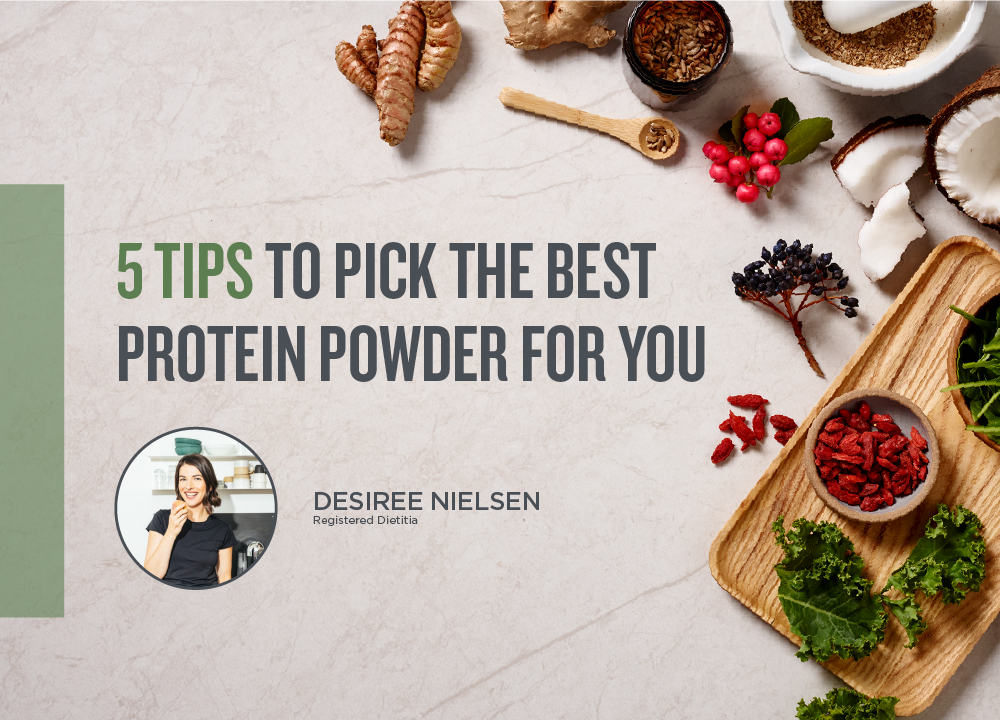
Protein powder can be a significant investment, especially if you plan to use it regularly. Therefore, considering the cost per serving and overall value of different protein powders is crucial. A good protein powder should provide high-quality protein, essential nutrients, and excellent taste and mixability without breaking the bank.
Evaluating Brands and Finding the Best Value, 5 tips on picking the best protein powder for you
To find the best value for your money, compare prices per serving across different brands and product sizes. Consider the protein content, ingredient quality, and additional features like added vitamins and minerals. Look for deals and promotions offered by manufacturers or retailers.
It’s essential to compare the price per gram of protein rather than just the total price. This will give you a more accurate understanding of the value you’re getting.
Finding Discounts, Promotions, and Bulk Buying Options
Several ways to save money on protein powder include:
- Subscribe and Save:Many brands offer subscription services that provide discounts on regular purchases.
- Bulk Buying:Buying protein powder in larger quantities can often lead to significant savings per serving.
- Coupons and Promo Codes:Look for online coupons and promo codes offered by retailers or manufacturers.
- Sales and Clearance Events:Keep an eye out for sales and clearance events at online retailers and physical stores.
- Loyalty Programs:Some retailers offer loyalty programs that provide discounts and rewards for frequent purchases.
Final Review
Choosing the right protein powder is a personalized journey, and the tips Artikeld above provide a solid framework for making an informed decision. Remember to consider your individual needs, prioritize quality ingredients, and explore different options until you find the perfect fit for your taste and budget.
With a little research and experimentation, you can confidently select a protein powder that supports your fitness goals and complements your overall health and well-being.


